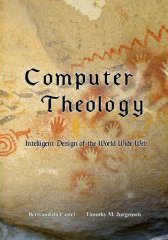PRESS
COMPUTER THEOLOGY |
||||
|
might call
this a ping. Its purpose is to
periodically confirm that the lines of communication are still open. The second
(“Let this cup pass from me”) is very definitely a petitioner’s request. The
request (consideration sought) is specific while the exchange offer
(consideration offered) is vague, but open-ended. It is clear, however, that
the goal of the transaction is consideration
requested for consideration offered. So, we can discern from each a well
defined framework for a transaction. It is clear who the parties to the
transaction are, what the subject of concern is, the desired outcome, the
consideration due to the various parties, and the implied consequences of
honorably, or even dishonorably, concluding the transaction. A familiar homily
suggests that “There are no atheists in fox-holes.” When external stimuli are
applied at the level of our most basic needs, at the level of safety or
physiological requirements, we are apt to address ourselves to the highest
trust authority of our primordial social ecosystem. A rather cold, calculating
way to say it is that when we’re scared out of our wits, we turn for protection
to the god that we might well have ignored up to now. It is at such a time that
we tend to recognize the source of last resort to our most desperate need of
safety and protection, or more appropriately, of actions of redemption that we urgently
require. It is reinforcing here that our prayers are directed at the ultimate
trust purveyor in our social ecosystem (say God), not the ultimate policy
arbiter (say the Pope). Remember back in
the first chapter, that this was one of the theses posted by Martin Luther. The
Pope, who was the ultimate policy arbiter within the policy infrastructure in
question, could only deal with supplicants to the point of their death, not
beyond. Death forms a hard boundary of the observable physical ecosystem. Prayer,
however, is a transaction specifically aimed beyond the boundary of the policy
infrastructure. It is a direct appeal to a deity to “please forget about the
physical laws.” If it requires repealing the natural force of gravity to keep
our plane from crashing, that’s perfectly all right in this instance. Again,
our point here is not to delve too deeply into the theological implications of
prayer, and certainly not to disparage the earnest pleas for help that we may
make when faced with dire situations, or even just the general events of our
normal lives for that matter. But, from a social ecosystem perspective, it might
be construed as a differentiating factor between the formal definitions of
religion based social systems and égalité oriented, secular social systems.
However, we also recognize that in reality such interactions do occur within
secular systems, we just don’t generally consider their existence in a formal
definition of the system. As we’ve seen with our earlier discussion of Roe versus
Wade, within the So, concerning members of the human species, can we discern a more formal specification of the mechanism that we recognize as prayer and why it forms a typical interaction method in the most critical of situations? It seems to us that it is the logical outcome of the trust and policy infrastructures that we humans use to establish and operate our grouping mechanisms. In times of ultimate need, when we present the ultimate stimulus for interaction, we seek redress from the highest arbiters of trust in our experience. For those in whom the threshold of religion grounded trust is continuously high, for the true believers, prayer is both a routine mechanism as well as a routinely satisfying one. Whether it’s a function of how one prays, the semantics of the language that is used to pray, the policy that is the subject of prayer, or the potential recourse of prayer, this most intimate of religious activities would seem worthy of study and formalization within the context of interactions among the human species. Prayer brings into play the concepts of ritual and |
||||
|
||||
© Midori Press, LLC, 2008. All rights reserved for all countries. (Inquiries) The contents of ComputerTheology: Intelligent Design of the World Wide Web are presented for the sole purpose of on-line reading to allow the reader to determine whether to purchase the book. Reproduction and other derivative works are expressly forbidden without the written consent of Midori Press. Legal deposit with the US Library of Congress 1-33735636, 2007.
|
ComputerTheology Intelligent Design of the World Wide Web Bertrand du Castel and Timothy M. Jurgensen Midori Press, Austin Texas 1st Edition 2008 (468 pp) ISBN 0-9801821-1-5 |
Book available at Midori Press (regular) |
